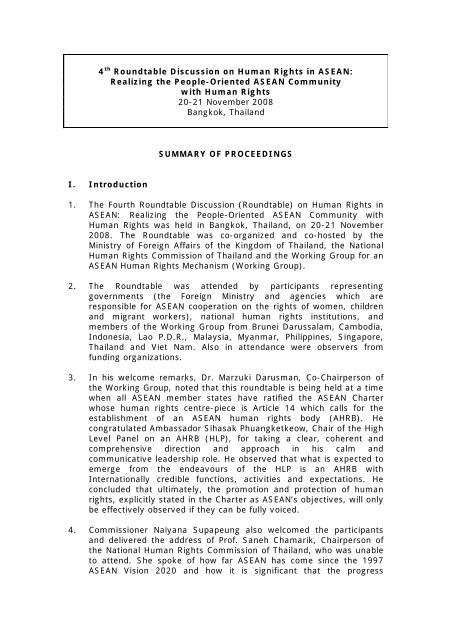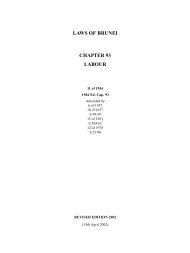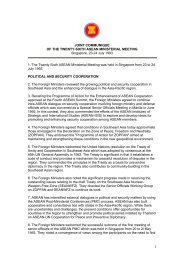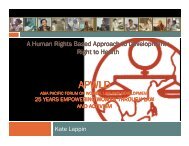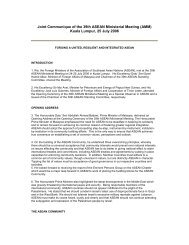4th RTD Summary of Proceedings (Final).pdf - Working Group for an ...
4th RTD Summary of Proceedings (Final).pdf - Working Group for an ...
4th RTD Summary of Proceedings (Final).pdf - Working Group for an ...
You also want an ePaper? Increase the reach of your titles
YUMPU automatically turns print PDFs into web optimized ePapers that Google loves.
4 th Roundtable Discussion on Hum<strong>an</strong> Rights in ASEAN:<br />
Realizing the People-Oriented ASEAN Community<br />
with Hum<strong>an</strong> Rights<br />
20-21 November 2008<br />
B<strong>an</strong>gkok, Thail<strong>an</strong>d<br />
SUMMARY OF PROCEEDINGS<br />
I. Introduction<br />
1. The Fourth Roundtable Discussion (Roundtable) on Hum<strong>an</strong> Rights in<br />
ASEAN: Realizing the People-Oriented ASEAN Community with<br />
Hum<strong>an</strong> Rights was held in B<strong>an</strong>gkok, Thail<strong>an</strong>d, on 20-21 November<br />
2008. The Roundtable was co-org<strong>an</strong>ized <strong>an</strong>d co-hosted by the<br />
Ministry <strong>of</strong> Foreign Affairs <strong>of</strong> the Kingdom <strong>of</strong> Thail<strong>an</strong>d, the National<br />
Hum<strong>an</strong> Rights Commission <strong>of</strong> Thail<strong>an</strong>d <strong>an</strong>d the <strong>Working</strong> <strong>Group</strong> <strong>for</strong> <strong>an</strong><br />
ASEAN Hum<strong>an</strong> Rights Mech<strong>an</strong>ism (<strong>Working</strong> <strong>Group</strong>).<br />
2. The Roundtable was attended by particip<strong>an</strong>ts representing<br />
governments (the Foreign Ministry <strong>an</strong>d agencies which are<br />
responsible <strong>for</strong> ASEAN cooperation on the rights <strong>of</strong> women, children<br />
<strong>an</strong>d migr<strong>an</strong>t workers), national hum<strong>an</strong> rights institutions, <strong>an</strong>d<br />
members <strong>of</strong> the <strong>Working</strong> <strong>Group</strong> from Brunei Darussalam, Cambodia,<br />
Indonesia, Lao P.D.R., Malaysia, My<strong>an</strong>mar, Philippines, Singapore,<br />
Thail<strong>an</strong>d <strong>an</strong>d Viet Nam. Also in attend<strong>an</strong>ce were observers from<br />
funding org<strong>an</strong>izations.<br />
3. In his welcome remarks, Dr. Marzuki Darusm<strong>an</strong>, Co-Chairperson <strong>of</strong><br />
the <strong>Working</strong> <strong>Group</strong>, noted that this roundtable is being held at a time<br />
when all ASEAN member states have ratified the ASEAN Charter<br />
whose hum<strong>an</strong> rights centre-piece is Article 14 which calls <strong>for</strong> the<br />
establishment <strong>of</strong> <strong>an</strong> ASEAN hum<strong>an</strong> rights body (AHRB). He<br />
congratulated Ambassador Sihasak Phu<strong>an</strong>gketkeow, Chair <strong>of</strong> the High<br />
Level P<strong>an</strong>el on <strong>an</strong> AHRB (HLP), <strong>for</strong> taking a clear, coherent <strong>an</strong>d<br />
comprehensive direction <strong>an</strong>d approach in his calm <strong>an</strong>d<br />
communicative leadership role. He observed that what is expected to<br />
emerge from the endeavours <strong>of</strong> the HLP is <strong>an</strong> AHRB with<br />
Internationally credible functions, activities <strong>an</strong>d expectations. He<br />
concluded that ultimately, the promotion <strong>an</strong>d protection <strong>of</strong> hum<strong>an</strong><br />
rights, explicitly stated in the Charter as ASEAN’s objectives, will only<br />
be effectively observed if they c<strong>an</strong> be fully voiced.<br />
4. Commissioner Naiy<strong>an</strong>a Supapeung also welcomed the particip<strong>an</strong>ts<br />
<strong>an</strong>d delivered the address <strong>of</strong> Pr<strong>of</strong>. S<strong>an</strong>eh Chamarik, Chairperson <strong>of</strong><br />
the National Hum<strong>an</strong> Rights Commission <strong>of</strong> Thail<strong>an</strong>d, who was unable<br />
to attend. She spoke <strong>of</strong> how far ASEAN has come since the 1997<br />
ASEAN Vision 2020 <strong>an</strong>d how it is signific<strong>an</strong>t that the progress
towards <strong>an</strong> AHRB is not the exclusive business <strong>of</strong> political leaders but<br />
is understood as the collective ef<strong>for</strong>t, both governmental <strong>an</strong>d nongovernmental,<br />
in the common task <strong>of</strong> developing a people-oriented<br />
ASEAN Community. Mention was also made <strong>of</strong> the recent Declaration<br />
on the Rights <strong>of</strong> Indigenous Peoples <strong>an</strong>d how this was the product <strong>of</strong><br />
hard work <strong>an</strong>d struggle over time particularly on the part <strong>of</strong> the<br />
South Americ<strong>an</strong> advocates <strong>an</strong>d a suggestion was pr<strong>of</strong>fered that this<br />
could actually be a common ground <strong>for</strong> upcoming partnerships<br />
among regional hum<strong>an</strong> rights communities in different parts <strong>of</strong> the<br />
world. Lastly, the need to consider the promotion <strong>of</strong> mutual peopleto-people<br />
learning <strong>an</strong>d underst<strong>an</strong>ding in the discussion <strong>of</strong> the<br />
proposed evolutionary approach was also underscored, <strong>an</strong>d a<br />
recommendation was made that participatory research involving real<br />
<strong>an</strong>d ordinary people across ASEAN could be initiated in addition to<br />
pl<strong>an</strong>ned studies on thematic issues.<br />
5. H.E. Charivat S<strong>an</strong>taputra, Deputy Perm<strong>an</strong>ent Secretary <strong>for</strong> Foreign<br />
Affairs <strong>of</strong> Thail<strong>an</strong>d, delivered the Keynote Address in behalf <strong>of</strong> the<br />
Perm<strong>an</strong>ent Secretary, H.E. Mr. Virasakdi Futrakul. He observed that<br />
the ratification <strong>of</strong> the Charter marks a new chapter <strong>for</strong> hum<strong>an</strong> rights<br />
in ASEAN <strong>an</strong>d described the <strong>for</strong>eign ministry’s co-org<strong>an</strong>izing <strong>of</strong> the<br />
Roundtable as part <strong>of</strong> the Royal Thai Governmen’t ongoing ef<strong>for</strong>ts to<br />
encourage greater participation <strong>an</strong>d involvement <strong>of</strong> all stakeholders<br />
in the ASEAN community building process. He expressed the belief<br />
that the establishment <strong>of</strong> the AHRB will put ASEAN on par with other<br />
regional org<strong>an</strong>izations which already have their own hum<strong>an</strong> rights<br />
bodies, <strong>an</strong>d that the AHRB c<strong>an</strong> indeed play a signific<strong>an</strong>t role in<br />
mainstreaming hum<strong>an</strong> rights in ASEAN including to raise public<br />
awareness on hum<strong>an</strong> rights <strong>an</strong>d to strengthen the capacity <strong>of</strong> states<br />
to promote <strong>an</strong>d protect hum<strong>an</strong> rights. He also touched on the<br />
evolutionary process <strong>an</strong>d observed that the body c<strong>an</strong> develop<br />
incrementally <strong>an</strong>d move <strong>for</strong>ward at a com<strong>for</strong>table pace <strong>for</strong> all but that<br />
it must also be able to strike the right bal<strong>an</strong>ce between promotion<br />
<strong>an</strong>d protection functions so as to be credible in the eyes <strong>of</strong> the<br />
international community as well as the people <strong>of</strong> ASEAN. His<br />
Excellency also described the AHRB as one <strong>of</strong> the m<strong>an</strong>ifestations <strong>of</strong><br />
the commitment to building a people-oriented ASEAN <strong>an</strong>d cited the<br />
HLP’s regular consultations with regional stakeholders, <strong>an</strong>d asserted<br />
that this participation <strong>an</strong>d access by the people should continue once<br />
the AHRB is operational. He emphasized that the commitment <strong>an</strong>d<br />
support <strong>of</strong> all ASEAN member-states is crucial <strong>for</strong> the smooth <strong>an</strong>d<br />
credible operation <strong>of</strong> the AHRB <strong>an</strong>d popular support helps ensure that<br />
the necessary political <strong>an</strong>d fin<strong>an</strong>cial support is rendered to the body<br />
when launched. In conclusion, he encouraged participation at the<br />
Roundtable <strong>an</strong>d opined that the deliberations during the next two<br />
days would be critical to ASEAN’s future <strong>an</strong>d expressed his<br />
confidence that the collective wisdom, experience <strong>an</strong>d dedication <strong>of</strong><br />
the particip<strong>an</strong>ts will provide the guiding light <strong>for</strong> the new era <strong>of</strong><br />
cooperations on hum<strong>an</strong> rights in ASEAN.<br />
2
II. Roundtable Sessions<br />
6. The Roundtable was divided into six sessions covering the following<br />
topics: (a) The ASEAN Charter: The New Age <strong>of</strong> Hum<strong>an</strong> Rights in<br />
ASEAN; (b) Promotion <strong>an</strong>d Protection <strong>of</strong> Rights <strong>of</strong> Women <strong>an</strong>d<br />
Children in ASEAN Context; (c) Promotion <strong>an</strong>d Protection <strong>of</strong> Rights <strong>of</strong><br />
Migr<strong>an</strong>t Workers in ASEAN Context; (d) The Role <strong>of</strong> National Hum<strong>an</strong><br />
Rights Institutions in the Ch<strong>an</strong>ging Environment <strong>of</strong> ASEAN; (e)<br />
Establishing <strong>an</strong> ASEAN Hum<strong>an</strong> Rights Body <strong>an</strong>d its Relationship with<br />
Other Hum<strong>an</strong> Rights Mech<strong>an</strong>isms in ASEAN: Pending Issues <strong>for</strong><br />
Consideration; <strong>an</strong>d (f) Conclusions <strong>an</strong>d Recommendations.<br />
7. In Session One, “The ASEAN Charter: The New Age <strong>of</strong> Hum<strong>an</strong> Rights<br />
in ASEAN”, H.E. Sihasak Phu<strong>an</strong>gketkeow, Chairperson <strong>of</strong> the HLP<br />
shared the progress <strong>an</strong>d developments in the drafting <strong>of</strong> the terms <strong>of</strong><br />
reference (ToR) <strong>for</strong> <strong>an</strong> ASEAN hum<strong>an</strong> rights body. He discussed some<br />
<strong>of</strong> the key elements that are being considered by the HLP taking into<br />
consideration both the international <strong>an</strong>d regional context. He shared<br />
that although ASEAN has made progress in the areas <strong>of</strong> women <strong>an</strong>d<br />
children, migr<strong>an</strong>t workers <strong>an</strong>d hum<strong>an</strong> trafficking, a lot still has to be<br />
done in terms <strong>of</strong> promotion <strong>an</strong>d protection <strong>of</strong> hum<strong>an</strong> rights. He<br />
briefly traced the roots <strong>of</strong> the discussion on <strong>an</strong> ASEAN hum<strong>an</strong> rights<br />
body <strong>an</strong>d concluded that the <strong>Working</strong> <strong>Group</strong> <strong>for</strong> <strong>an</strong> ASEAN Hum<strong>an</strong><br />
Rights Mech<strong>an</strong>ism has inspired ASEAN to do the groundwork leading<br />
to the current developments. During the open <strong>for</strong>um, a number <strong>of</strong><br />
particip<strong>an</strong>ts brought up certain issues <strong>for</strong> the consideration <strong>of</strong> the<br />
HLP: the import<strong>an</strong>ce <strong>of</strong> AHRB to deal not only with promotion but<br />
also with protection, to see the hum<strong>an</strong> rights body have <strong>an</strong> effective<br />
en<strong>for</strong>cement mech<strong>an</strong>ism, the cross-cutting nature <strong>of</strong> hum<strong>an</strong> rights in<br />
the three communities <strong>of</strong> ASEAN, the possible relationship <strong>of</strong> the<br />
hum<strong>an</strong> rights body with other specialized hum<strong>an</strong> rights mech<strong>an</strong>isms<br />
that is being considered by ASEAN, <strong>an</strong>d reconciling the principles <strong>of</strong><br />
consensus <strong>an</strong>d non-interference with the m<strong>an</strong>date <strong>of</strong> the hum<strong>an</strong><br />
rights body. The HLP Chair took note <strong>of</strong> a suggestion to map the<br />
current hum<strong>an</strong> rights practices <strong>an</strong>d laws across ASEAN countries. The<br />
session was moderated by Mr. Wigberto Tañada, Chairperson <strong>of</strong> the<br />
Philippine <strong>Working</strong> <strong>Group</strong> <strong>for</strong> <strong>an</strong> ASEAN Hum<strong>an</strong> Rights Mech<strong>an</strong>ism.<br />
8. In Session Two, “Promotion <strong>an</strong>d Protection <strong>of</strong> Rights <strong>of</strong> Women <strong>an</strong>d<br />
Children in ASEAN Context”, Dr. Sriprapha Petcharamesree <strong>of</strong><br />
Mahidol University’s Office <strong>of</strong> Hum<strong>an</strong> Rights Studies <strong>an</strong>d Social<br />
Development, made a brief survey <strong>of</strong> the laws, policies, <strong>an</strong>d<br />
mech<strong>an</strong>isms regarding the rights <strong>of</strong> women <strong>an</strong>d children in ASEAN<br />
countries <strong>an</strong>d outlined the existing relev<strong>an</strong>t regional hum<strong>an</strong> rights<br />
systems. She shared her insights on the value that may be added by<br />
the establishment <strong>of</strong> the ASEAN Commission on the Promotion <strong>an</strong>d<br />
Protection <strong>of</strong> the Rights <strong>of</strong> Women <strong>an</strong>d Children (ACWC), such as the<br />
fact that it c<strong>an</strong> have the ability to address issues specific to women<br />
<strong>an</strong>d children. In conclusion, she raised pending issues <strong>for</strong><br />
determination such as possible functional cooperation overlaps, one<br />
ot two separate bodies, whether <strong>an</strong> instrument or <strong>an</strong> institution<br />
should come first, <strong>an</strong>d whether all ten ASEAN Member States should<br />
3
e on board or whether the “minus-x” <strong>for</strong>mula should be used.<br />
Comments from the floor included the possibility <strong>of</strong> proceeding on the<br />
matter <strong>of</strong> the ACWC independently without waiting <strong>for</strong> the AHRB to<br />
be created, the import<strong>an</strong>ce <strong>of</strong> political will in the process, <strong>an</strong>d how<br />
establishing the ACWC might contribute better to capacity-building.<br />
Updates were also given regarding the two joint roundtable<br />
discussions <strong>an</strong>d meetings which the focal points <strong>for</strong> ACW <strong>an</strong>d<br />
SOMSWD had in April <strong>an</strong>d October <strong>an</strong>d the resulting consensus to set<br />
up a multi-disciplinary working group whose terms <strong>of</strong> reference will<br />
be presented to the ACW <strong>an</strong>d SOMSWD <strong>for</strong> consideration in the 1 st<br />
quarter <strong>of</strong> 2009. The session was moderated by Ms. Hesti Armiwul<strong>an</strong>,<br />
Vice Chairperson <strong>for</strong> External Affairs <strong>of</strong> the Indonesi<strong>an</strong> National<br />
Hum<strong>an</strong> Rights Commission (KOMNAS HAM).<br />
9. In Session Three, “Promotion <strong>an</strong>d Protection <strong>of</strong> Rights <strong>of</strong> Migr<strong>an</strong>t<br />
Workers in ASEAN Context”, Ms. Braema Mathiapar<strong>an</strong>am,<br />
Chairperson <strong>of</strong> the Singapore <strong>Working</strong> <strong>Group</strong> <strong>for</strong> <strong>an</strong> ASEAN Hum<strong>an</strong><br />
Rights Mech<strong>an</strong>ism, gave a comprehensive overview <strong>of</strong> the mobility <strong>of</strong><br />
labor within <strong>an</strong>d from ASEAN where <strong>an</strong> estimated 12 million migr<strong>an</strong>t<br />
workers are from. She also discussed the nexus between hum<strong>an</strong><br />
rights <strong>an</strong>d migr<strong>an</strong>t workers at length <strong>an</strong>d the implications <strong>of</strong> the<br />
ASEAN Declaration on Migr<strong>an</strong>t Workers. She concluded her<br />
presentation by tabling recommendations which included, among<br />
others, the establishment <strong>of</strong> a commission beyond a committee <strong>for</strong><br />
the promotion <strong>an</strong>d protection <strong>of</strong> the rights <strong>of</strong> migr<strong>an</strong>t workers; the<br />
consideration <strong>of</strong> a protocol on the protection <strong>of</strong> migr<strong>an</strong>t workers;<br />
serious review <strong>of</strong> a common definition <strong>of</strong> a migr<strong>an</strong>t worker; the<br />
alignment <strong>of</strong> regional ef<strong>for</strong>ts with local laws; raise awareness among<br />
ASEAN countries to encourage recruiters <strong>of</strong> labor to comply with<br />
corporate social responsibility principles; <strong>an</strong>d stepping up<br />
government consultations with relev<strong>an</strong>t civil society org<strong>an</strong>ization.<br />
During the open <strong>for</strong>um, issues raised included the present<br />
exploitative state <strong>of</strong> migration with only the unscrupulous labor<br />
export comp<strong>an</strong>ies benefiting, the possibility <strong>of</strong> having free movement<br />
<strong>of</strong> services <strong>an</strong>d people within ASEAN in the future comparable to the<br />
present EU set-up, the need <strong>for</strong> cohesion in policies across the region<br />
as migr<strong>an</strong>t workers issues are <strong>of</strong>tentimes tr<strong>an</strong>s-border, <strong>an</strong>d the<br />
fundamental duty <strong>of</strong> the state to protect its own people. The<br />
advisability <strong>of</strong> advocating <strong>for</strong> a separate commission as well as the<br />
need to advocate <strong>for</strong> ratification <strong>of</strong> the UN Convention on Migr<strong>an</strong>ts’<br />
Rights were also touched upon. Ideas <strong>for</strong> follow-up programming on<br />
critical issues such as children migr<strong>an</strong>ts were also floated. The<br />
session was moderated by Commissioner Ma. Victoria Cardona <strong>of</strong> the<br />
Commission on Hum<strong>an</strong> Rights <strong>of</strong> the Philippines.<br />
10. In Session Four, “The Role <strong>of</strong> National Hum<strong>an</strong> Rights Institutions in<br />
the Ch<strong>an</strong>ging Environment <strong>of</strong> ASEAN”, T<strong>an</strong> Sri Datuk Seri P<strong>an</strong>glima<br />
Simon Sipaun, Vice Chairperson, National Hum<strong>an</strong> Rights Commission<br />
<strong>of</strong> Malaysia (SUHAKAM), touched on the cooperation <strong>of</strong> the four<br />
NHRIs <strong>an</strong>d how they c<strong>an</strong> contribute to the ch<strong>an</strong>ging environment <strong>of</strong><br />
ASEAN. He gave <strong>an</strong> overview <strong>of</strong> the initiatives <strong>of</strong> SUHAKAM <strong>an</strong>d the<br />
other NHRIs in ASEAN, both independently <strong>an</strong>d collectively, in the<br />
4
initiative <strong>for</strong> the establishment <strong>of</strong> <strong>an</strong> AHRB. With a view to the<br />
possibility <strong>of</strong> other countries establishing NHRIs, T<strong>an</strong> Sri Simon then<br />
shared his personal insights on the matter, which included advocating<br />
<strong>for</strong> wide consultation with civil society on the draft bill to set up the<br />
NHRI, comprehensiveness <strong>of</strong> its m<strong>an</strong>date, tr<strong>an</strong>sparent procedures<br />
such as appointments, <strong>an</strong>d fixed-term appointments, to ensure its<br />
independence. He then expressed the hope that the future NHRIs<br />
learn from the lessons <strong>an</strong>d challenges faced by the existing ones. In<br />
her turn, Dr. Kek Galabru, President <strong>of</strong> LICADHO <strong>an</strong>d Chairperson <strong>of</strong><br />
the Cambodi<strong>an</strong> <strong>Working</strong> <strong>Group</strong> <strong>for</strong> <strong>an</strong> ASEAN Hum<strong>an</strong> Rights<br />
Mech<strong>an</strong>ism, spoke <strong>of</strong> the global <strong>an</strong>d regional factors which have<br />
directly affected hum<strong>an</strong> rights <strong>an</strong>d the institutions designed to<br />
protect them. She commented on how a rising "Southeast Asi<strong>an</strong>"<br />
spirit appears to be emerging in the field <strong>of</strong> hum<strong>an</strong> rights even as<br />
there remains instability brought about by economic <strong>an</strong>d geopolitical<br />
factors, <strong>an</strong>d how this context me<strong>an</strong>s that the establishment <strong>of</strong> a<br />
national hum<strong>an</strong> rights institution (NHRI) will face considerable<br />
challenges, e.g., countries with poor hum<strong>an</strong> rights records may try to<br />
use the NHRI to whitewash the government's image. She maintained<br />
that <strong>an</strong> NHRI c<strong>an</strong> only act effectively if the political system is<br />
functioning properly. She observed how even countries with NHRIs<br />
appear to have been bothered by internal conflict but that the<br />
challenges <strong>an</strong>d problems this situation presents c<strong>an</strong> also be viewed<br />
as opportunities <strong>for</strong> <strong>an</strong> NHRI to present itself as <strong>an</strong> efficient mediator.<br />
Lastly, she underscored that NHRIs should try to foster good<br />
relations with both government <strong>an</strong>d citizens to ensure legitimacy, <strong>an</strong>d<br />
keep in const<strong>an</strong>t communication with NGOs as well as with the UN<br />
<strong>an</strong>d multilateral bodies in order to ensure their independence while<br />
adjusting themselves to international hum<strong>an</strong> rights st<strong>an</strong>dards. During<br />
the open <strong>for</strong>um, the three other NHRIs shared their views regarding<br />
their role vis-à-vis the proposed AHRB <strong>an</strong>d agreed that it could be<br />
viewed as being catalytic, complementary, <strong>an</strong>d coordinative. In<br />
relation to countries whose governments were interested in<br />
establishing <strong>an</strong> NHRI, the existing ones c<strong>an</strong> also provide technical<br />
assist<strong>an</strong>ce, including strengthening the capacity <strong>of</strong> stakeholders.<br />
Suggestions coming from the floor included looking into possible<br />
working relationship with ASEAN, engaging other stakeholders,<br />
following up on earlier signs <strong>of</strong> interest on the part <strong>of</strong> certain<br />
governments to work towards the establishment <strong>of</strong> NHRIs, <strong>an</strong>d<br />
encouraging these governments to publicize their preliminary ef<strong>for</strong>ts<br />
at a step-by-step consideration <strong>of</strong> <strong>an</strong> NHRI. The session was<br />
moderated by Dato Param Cumaraswamy <strong>of</strong> the <strong>Working</strong> <strong>Group</strong>.<br />
11. In Session Five, “Establishing <strong>an</strong> ASEAN Hum<strong>an</strong> Rights Body <strong>an</strong>d its<br />
Relationship with Other Hum<strong>an</strong> Rights Mech<strong>an</strong>isms in ASEAN:<br />
Pending Issues <strong>for</strong> Consideration”, Pr<strong>of</strong>. Vitit Muntarbhorn <strong>of</strong><br />
Chulalongkorn University <strong>an</strong>d Co-Chairperson <strong>of</strong> the <strong>Working</strong> <strong>Group</strong><br />
gave <strong>an</strong> overview on the three current tracks in ASEAN (relating to<br />
the ASEAN Committee on the Implementation <strong>of</strong> the ASEAN<br />
Declaration on the Protection <strong>an</strong>d Promotion <strong>of</strong> the Rights <strong>of</strong> Migr<strong>an</strong>t<br />
Workers, the VAP-proposed ACWC, <strong>an</strong>d the Charter-based AHRB) <strong>an</strong>d<br />
the current discussion on “aligning” these mech<strong>an</strong>isms. He then<br />
5
aised questions <strong>for</strong> discussion: (1) What will be the relationship <strong>of</strong><br />
the ASEAN bodies to be created with each other (2) Is there a need<br />
<strong>for</strong> such bodies Why or why not (3) Who should compose them<br />
(4) What should these bodies do (5) How are they to be created<br />
(6) How c<strong>an</strong> real impact be ensured<br />
12. After Pr<strong>of</strong>. Muntarbhorn’s initial exposition <strong>of</strong> issues, the particip<strong>an</strong>ts<br />
joined three break-out groups moderated by Ms. Sutarti Soedewo <strong>of</strong><br />
the Indonesi<strong>an</strong> Ministry <strong>for</strong> Women Empowerment, Dr. Budiono<br />
Kusumohamidjojo <strong>of</strong> the <strong>Working</strong> <strong>Group</strong>, <strong>an</strong>d Atty. Jake Mejia <strong>of</strong> the<br />
Commission on Hum<strong>an</strong> Rights <strong>of</strong> the Philippines. Rapporteurs from<br />
each break-out group then shared the results <strong>of</strong> the discussions in<br />
plenary. T<strong>an</strong> Sri Simon Sipaun <strong>of</strong> SUHAKAM reported the discussion<br />
<strong>of</strong> <strong>Group</strong> 1 which, while discussing other issues <strong>of</strong> concern, focused<br />
on the ACWC with the consensus that its establishment should go on<br />
but should not be at the expense <strong>of</strong> the AHRB. Their discussions<br />
included the rationale <strong>for</strong> a separate commission on women <strong>an</strong>d<br />
children <strong>an</strong>d its possible composition, the import<strong>an</strong>ce <strong>of</strong> the<br />
protection elements <strong>of</strong> the AHRB <strong>an</strong>d <strong>of</strong> the ToR providing<br />
benchmarks <strong>for</strong> such m<strong>an</strong>date including the competence to receive<br />
communication from individuals in the evolution process. <strong>Group</strong> 1<br />
also endorsed the results <strong>of</strong> the Joint Roundtable Discussion on the<br />
Establishment <strong>of</strong> <strong>an</strong> ASEAN Commission on the Protection <strong>an</strong>d<br />
Promotion <strong>of</strong> the Rights <strong>of</strong> Women <strong>an</strong>d Children <strong>of</strong> April 2008. Comm.<br />
Cardona <strong>of</strong> the CHRP presented the report <strong>of</strong> <strong>Group</strong> 2 <strong>an</strong>d observed,<br />
among other things, that they agreed that the AHRB should go<br />
beyond promotion <strong>an</strong>d just getting reports, the ACWC should be<br />
established separately, <strong>an</strong>d all selection processes should be nonpoliticized<br />
<strong>an</strong>d non-partis<strong>an</strong>. <strong>Group</strong> 2’s discussion acknowledged the<br />
need <strong>for</strong> further dialogue to bridge the differing views on various<br />
issues dealing with hum<strong>an</strong> rights among governments <strong>an</strong>d civil<br />
societies in the ASEAN region. Ms. Braema Mathiapar<strong>an</strong>am <strong>of</strong> the<br />
Singapore <strong>Working</strong> <strong>Group</strong> relayed the discussions <strong>of</strong> <strong>Group</strong> 3 which<br />
was able to tackle all the questions. Highlights <strong>of</strong> their discussion<br />
include the agreement that the specialized bodies c<strong>an</strong>not merely be<br />
subsumed under a general AHRB but that the latter c<strong>an</strong> be similar to<br />
a governing parent body while the ACWC <strong>an</strong>d a suggested ASEAN<br />
Commission on Migr<strong>an</strong>t Workers (ACMW) are aligned with it but act<br />
independently albeit in cooperation with each other <strong>an</strong>d from a<br />
rights-based framework. They also discussed the value <strong>an</strong>d ratio <strong>of</strong><br />
having regional bodies (e.g., dist<strong>an</strong>ce <strong>of</strong> the UN <strong>an</strong>d the need to<br />
consider matters as our issues), as well as possible national selection<br />
procedures <strong>an</strong>d criteria <strong>for</strong> the composition <strong>of</strong> the bodies. The session<br />
was synthesized by Pr<strong>of</strong>. Muntarbhorn <strong>an</strong>d moderated by Dr. Budiono<br />
Kusumohamidjojo, Secretary-General <strong>of</strong> the Indonesi<strong>an</strong> <strong>Working</strong><br />
<strong>Group</strong> <strong>for</strong> <strong>an</strong> ASEAN Hum<strong>an</strong> Rights Mech<strong>an</strong>ism.<br />
13. In the final session, entitled “Conclusions <strong>an</strong>d Recommendations”,<br />
the particip<strong>an</strong>ts discussed <strong>an</strong>d adopted the proceedings <strong>of</strong> the<br />
Roundtable, including the conclusions <strong>an</strong>d recommendations. The<br />
session was moderated by Mr. M<strong>an</strong>asvi Srisodapol, Deputy Director-<br />
General <strong>of</strong> the Department <strong>of</strong> ASEAN Affairs <strong>of</strong> the Ministry <strong>of</strong> Foreign<br />
6
Affairs <strong>of</strong> <strong>of</strong> Thail<strong>an</strong>d, who also delivered the Closing Remarks.<br />
III. Conclusions <strong>an</strong>d Recommendations<br />
General<br />
14. The Roundtable believes that hum<strong>an</strong> rights should not be considered<br />
in isolation but should also take into account other fundamental<br />
principles such as the rule <strong>of</strong> law <strong>an</strong>d democracy.<br />
15. The Roundtable welcomes the imminent entry into <strong>for</strong>ce <strong>of</strong> the<br />
ASEAN Charter following its ratification by all member-states.<br />
16. The Roundtable notes that the HLP intends to submit the first draft <strong>of</strong><br />
the ToR <strong>of</strong> the AHRB to the ASEAN Foreign Ministers in December<br />
2008.<br />
17. The Roundtable notes that the timeline agreed upon by the ASEAN<br />
Foreign Ministers is to have the ToR <strong>of</strong> the AHRB finalized by 2009. In<br />
this connection, the Roundtable welcomes Thail<strong>an</strong>d’s commitment, as<br />
Chair <strong>of</strong> ASEAN, to ensure that the ToR <strong>of</strong> the AHRB c<strong>an</strong> be<br />
concluded by July 2009 <strong>an</strong>d that the body c<strong>an</strong> be launched by the<br />
end <strong>of</strong> 2009.<br />
Promotion <strong>an</strong>d Protection <strong>of</strong> the Rights <strong>of</strong> Women <strong>an</strong>d Children<br />
18. The Roundtable resolves that the process <strong>of</strong> establishing the ASEAN<br />
commission on the promotion <strong>an</strong>d protection <strong>of</strong> the rights <strong>of</strong> women<br />
<strong>an</strong>d children (ACWC) c<strong>an</strong> <strong>an</strong>d should be independent <strong>an</strong>d separate<br />
from the process <strong>of</strong> establishing the AHRB <strong>an</strong>d acknowledges that<br />
while there are streamlining issues to consider, these c<strong>an</strong> be dealt<br />
with more competently after the establishment <strong>of</strong> these bodies.<br />
19. The Roundtable believes that the establishment <strong>of</strong> the ACWC will<br />
complement the establishment <strong>of</strong> <strong>an</strong> AHRB, nurture regional<br />
responses to issues specific to women <strong>an</strong>d children’s rights, <strong>an</strong>d<br />
contribute better to building the capacities <strong>of</strong> stakeholders across the<br />
region.<br />
20. The Roundtable asserts that the ACWC should be seen as <strong>an</strong> end in<br />
itself.<br />
21. The Roundtable acknowledges the possible value <strong>of</strong> the ACWC as a<br />
plat<strong>for</strong>m <strong>for</strong> regional <strong>an</strong>d international dialogue which not only c<strong>an</strong><br />
assist ASEAN Member States in complying with international<br />
st<strong>an</strong>dards but actually upgrade the st<strong>an</strong>dards.<br />
22. The Roundtable believes that <strong>an</strong>y process involving the establishment<br />
<strong>an</strong>d workings <strong>of</strong> the ACWC should engage civil society as consultative<br />
partners <strong>an</strong>d that the functioning ACWC should be accountable to<br />
both the governments <strong>an</strong>d the peoples <strong>of</strong> ASEAN.<br />
7
23. The Roundtable welcomes the news that the ASEAN Committee on<br />
Women (ACW) <strong>an</strong>d the Senior Officials Meeting on Social Welfare <strong>an</strong>d<br />
Development (SOMSWD) have resolved to work together <strong>an</strong>d to set<br />
up a multidisciplinary <strong>Working</strong> <strong>Group</strong> (the “ACW-SOMSWD <strong>Working</strong><br />
<strong>Group</strong>”) in the first quarter <strong>of</strong> 2009 as a first step towards the<br />
establishment <strong>of</strong> the ACWC.<br />
24. The Roundtable encourages the ACW-SOMSWD <strong>Working</strong> <strong>Group</strong> to<br />
ensure that the proposed ACWC is consistent with international<br />
st<strong>an</strong>dards while capitalizing upon the wisdom <strong>of</strong> the ASEAN region,<br />
<strong>an</strong>d should be based on the Paris Principles, with emphasis on<br />
independence from governments, pluralistic composition <strong>an</strong>d<br />
representation, broad m<strong>an</strong>date with adequate powers, sufficient<br />
resources <strong>an</strong>d accessibility.<br />
25. The Roundtable further recommends that the ACW-SOMSWD <strong>Working</strong><br />
<strong>Group</strong> take into account the guiding principles <strong>of</strong> ASEAN <strong>an</strong>d use the<br />
CEDAW <strong>an</strong>d CRC as benchmarks <strong>of</strong> common legal st<strong>an</strong>dards under<br />
which ASEAN must not go below.<br />
Promotion <strong>an</strong>d Protection <strong>of</strong> the Rights <strong>of</strong> Migr<strong>an</strong>t Workers<br />
26. The Roundtable reaffirms the obligation <strong>of</strong> every ASEAN Member<br />
State to protect its citizens. It notes that while the government <strong>of</strong> a<br />
receiving state has <strong>an</strong> import<strong>an</strong>t role to play in the promotion <strong>an</strong>d<br />
protection <strong>of</strong> the rights <strong>of</strong> migr<strong>an</strong>t workers, it must not be <strong>for</strong>gotten<br />
that the state <strong>of</strong> origin also has the responsibility to protect the<br />
hum<strong>an</strong> rights <strong>of</strong> its own citizens.<br />
27. The Roundtable recommends that the ASEAN Committee on the<br />
Implementation <strong>of</strong> the ASEAN Declaration on the Protection <strong>an</strong>d<br />
Promotion <strong>of</strong> the Rights <strong>of</strong> Migr<strong>an</strong>t Workers ensure that the ASEAN<br />
instrument will be developed <strong>an</strong>d will include a clear definition <strong>of</strong><br />
migr<strong>an</strong>t workers.<br />
28. The Roundtable encourages all ASEAN Member States to consider the<br />
ratification <strong>of</strong> international conventions relev<strong>an</strong>t to migr<strong>an</strong>t workers<br />
rights, including the International Convention on the Protection <strong>of</strong> the<br />
Rights <strong>of</strong> All Migr<strong>an</strong>t Workers <strong>an</strong>d Members <strong>of</strong> Their Families.<br />
29. The Roundtable recommends that ASEAN Member States give<br />
renewed attention to the state <strong>of</strong> implementation <strong>of</strong> national laws<br />
<strong>an</strong>d policies which affect migr<strong>an</strong>t workers, <strong>an</strong>d coordinate where<br />
possible to attain a cohesive strategy <strong>for</strong> tr<strong>an</strong>s-border concerns.<br />
30. The Roundtable believes that measures to protect ASEAN migr<strong>an</strong>t<br />
workers have to be improved <strong>an</strong>d that looking at the good practices<br />
<strong>of</strong> other countries <strong>an</strong>d regions c<strong>an</strong> be beneficial. In this connection,<br />
the Roundtable notes further that the establishment <strong>of</strong> a thematic<br />
commission specifically <strong>for</strong> migr<strong>an</strong>t workers’ rights is <strong>an</strong> idea which<br />
c<strong>an</strong> be further examined.<br />
8
Network <strong>of</strong> National Hum<strong>an</strong> Rights Institutions in ASEAN (NHRIs)<br />
31. The Roundtable acknowledges that NHRIs in ASEAN are import<strong>an</strong>t<br />
stakeholders which the proposed AHRB will necessarily have to deal<br />
with. In particular, the NHRIs’ role vis-à-vis the AHRB is viewed as<br />
catalytic, complementary <strong>an</strong>d cooperative in character.<br />
32. The Roundtable acknowledges the numerous ways by which the<br />
NHRIs c<strong>an</strong> contribute to the AHRB <strong>an</strong>d other regional mech<strong>an</strong>isms <strong>of</strong><br />
protection which may be established, including: monitoring<br />
compli<strong>an</strong>ce with international instruments; receiving <strong>an</strong>d sharing<br />
in<strong>for</strong>mation with the AHRB <strong>an</strong>d coordinating activities on the national<br />
level; working together to assist in the establishment <strong>of</strong> future NHRIs<br />
in the region; <strong>an</strong>d assisting the AHRB in <strong>for</strong>ming cooperative ties with<br />
other regional systems.<br />
33. The Roundtable welcomes the shared news that some ASEAN<br />
Member States are presently considering, on a step-by-step<br />
approach, the feasibility <strong>of</strong> setting up <strong>an</strong> NHRI <strong>an</strong>d encourages such<br />
Member States to publicize in<strong>for</strong>mation on these ef<strong>for</strong>ts <strong>an</strong>d<br />
developments.<br />
34. The Roundtable welcomes the support that the network <strong>of</strong> the four<br />
existing NHRIs in Indonesia, Malaysia, the Philippines, <strong>an</strong>d Thail<strong>an</strong>d<br />
continues to extend to Cambodia in its ef<strong>for</strong>ts to establish its NHRI.<br />
35. The Roundtable further acknowledges <strong>an</strong>d supports the ways by<br />
which the 4 ASEAN NHRIs may be able to assist in the setting up <strong>of</strong><br />
future NHRIs, including by strengthening the capacity <strong>of</strong> stakeholders<br />
<strong>an</strong>d also providing technical assist<strong>an</strong>ce.<br />
36. The Roundtable recommends that <strong>an</strong>y ASEAN Member State wishing<br />
to set up <strong>an</strong> NHRI consider the following lessons <strong>an</strong>d insights from<br />
the existing commissions:<br />
• Civil society consultation on the process <strong>of</strong> establishing the NHRI,<br />
including discussions on the draft bill providing <strong>for</strong> such<br />
establishment;<br />
• Tr<strong>an</strong>sparency in the various steps <strong>an</strong>d procedures, including the<br />
appointment <strong>of</strong> commissioners<br />
• Fixed-term <strong>an</strong>d full-time appointments <strong>for</strong> the commissioners to<br />
ensure independence <strong>an</strong>d focus, as well as staggered retirement to<br />
maintain continuity <strong>an</strong>d institutional memory<br />
• Insistence on the inclusion <strong>of</strong> visitorial powers, whether <strong>an</strong>nounced<br />
or un<strong>an</strong>nounced, to places <strong>of</strong> detention <strong>for</strong> the NHRI<br />
• Definition <strong>of</strong> hum<strong>an</strong> rights as those contained in the articles <strong>of</strong> the<br />
Universal Declaration on Hum<strong>an</strong> Rights.<br />
9
Synthesis <strong>of</strong> <strong>Group</strong> Presentations<br />
37. The groups had <strong>an</strong> excellent opportunity to discuss the possible<br />
bodies in <strong>an</strong> open m<strong>an</strong>ner, <strong>an</strong>d the flow <strong>of</strong> thoughts appear to be to<br />
open the door to a variety <strong>of</strong> bodies but within a reasonable<br />
timeframe <strong>an</strong>d with due respect to the effectiveness <strong>of</strong> each in a<br />
complementary m<strong>an</strong>ner;<br />
38. The groups envision <strong>an</strong> overarching framework which includes the<br />
AHRB <strong>an</strong>d the commissions (on women <strong>an</strong>d children as well as<br />
migr<strong>an</strong>t workers), with due regard to alignment as well as<br />
cooperation <strong>an</strong>d collaboration between <strong>an</strong>d among them;<br />
39. The groups highlight the need to go beyond promotion towards<br />
protection, bearing in mind that a value added by such regional<br />
mech<strong>an</strong>isms is its proximity to the people; it is nearer th<strong>an</strong> the UN<br />
<strong>an</strong>d could be more accessible;<br />
40. The groups affirm that the bodies should be rules-based <strong>an</strong>d that<br />
they should function consistent with international norms <strong>an</strong>d<br />
st<strong>an</strong>dards;<br />
41. The groups assert the need <strong>for</strong> tr<strong>an</strong>sparent <strong>an</strong>d effective body or<br />
bodies;<br />
42. The groups believe that the individuals composing the bodies should<br />
act impartially <strong>an</strong>d effectively, with due regard to pluralism, gender<br />
sensitivity <strong>an</strong>d bal<strong>an</strong>ce, <strong>an</strong>d with active people participation in the<br />
nomination <strong>an</strong>d selection processes;<br />
43. The groups opine that impact is to be measured very much in terms<br />
<strong>of</strong> how the bodies function well <strong>an</strong>d effectively with due regard to the<br />
interrelationship <strong>an</strong>d interface with the peoples <strong>of</strong> ASEAN. Possible<br />
entry points in terms <strong>of</strong> impact assessment would include media,<br />
ASEAN poll, etc.;<br />
44. The groups emphasize the import<strong>an</strong>ce <strong>of</strong> implementation <strong>of</strong> hum<strong>an</strong><br />
rights through these hum<strong>an</strong> rights bodies <strong>an</strong>d these should abide by<br />
international st<strong>an</strong>dards;<br />
45. The groups welcome the possibility <strong>of</strong> the bodies linking up with the<br />
various ASEAN org<strong>an</strong>s including the ASEAN Summit; <strong>an</strong>d<br />
46. The groups recognize the need to give “life” to the bodies. This<br />
includes providing it with support <strong>an</strong>d necessary resources <strong>for</strong> their<br />
effective functioning.<br />
10
IV.<br />
Acknowledgment<br />
47. The Roundtable particip<strong>an</strong>ts expressed their appreciation to the<br />
Ministry <strong>of</strong> Foreign Affairs <strong>of</strong> the Kingdom <strong>of</strong> Thail<strong>an</strong>d, the National<br />
Hum<strong>an</strong> Rights Commission <strong>of</strong> Thail<strong>an</strong>d <strong>an</strong>d the <strong>Working</strong> <strong>Group</strong> <strong>for</strong> cohosting<br />
<strong>an</strong>d co-org<strong>an</strong>izing the Fourth Roundtable Discussion on<br />
Hum<strong>an</strong> Rights in ASEAN: Realizing the People-Oriented ASEAN<br />
Community with Hum<strong>an</strong> Rights, to the Friedrich Naum<strong>an</strong>n<br />
Foundation, the C<strong>an</strong>adi<strong>an</strong> International Development Agency (CIDA)-<br />
sponsored Southeast Asia Regional Cooperation on Hum<strong>an</strong><br />
Development (SEARCH) project, <strong>an</strong>d the Europe<strong>an</strong> Commission (EC)<br />
under the project “Enh<strong>an</strong>cing the Role <strong>of</strong> National Hum<strong>an</strong> Rights<br />
Institutions in the Development <strong>of</strong> <strong>an</strong> ASEAN Hum<strong>an</strong> Rights<br />
Mech<strong>an</strong>ism”, <strong>for</strong> providing crucial fin<strong>an</strong>cial support, <strong>an</strong>d to the<br />
members <strong>of</strong> the conference secretariat <strong>for</strong> all their hard work.<br />
11


